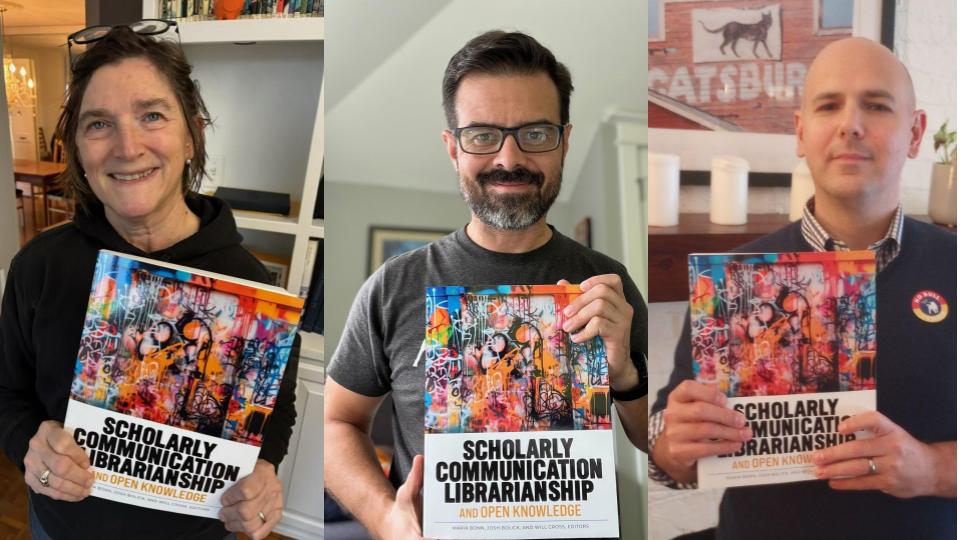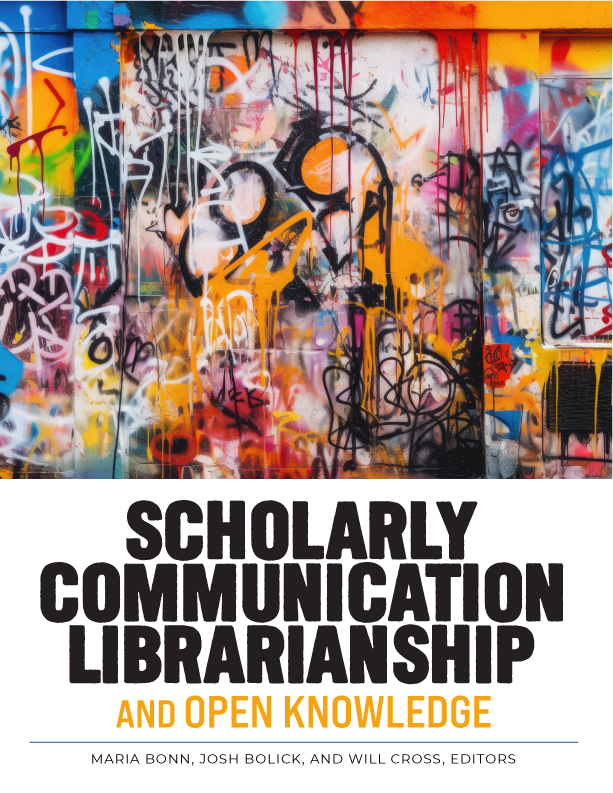Late last year, we announced that we would be releasing portions of our forthcoming book, Scholarly Communication Librarianship and Open Culture: Law, Economics, and Publishing, for open review as they were ready. Work on this project has progressed slower than we’d like due to the pandemic and the different pressures it has placed on everyone’s lives, but we’re steadily moving forward, extending grace and understanding to all involved (and trying to extend the same to ourselves; which is easier said than done). Today, we’re happy to invite comments on drafts of the Open Education Section. Reviewers will benefit from taking a look at information about Part 1 and other sections of Part 2 to understand how this section relates to the others, and the whole.
The Open Education Section is edited by Lillian Hogendoorn, Curator of Digital Experience Librarian at the University of Toronto. Previously, Lillian was the Manager of Digital Access and Open Educational Resources at eCampusOntario. She also teaches the Library Juice Academy Introduction to Open Educational Resources course. Her extensive experience and knowledge places her in an excellent position to lead this section, and we’re very proud to work with her. She’s also brought on some rock star contributors that we’re excited to have. We hope you’ll consider reading their drafts and providing your feedback to help us get the most accurate snapshot possible of this dynamic area of work. Lillian introduces the section and guiding questions below, along with links to the drafts and info for reviewers. The big guidance we want to reinforce is to be the reviewer you wish you had by providing thoughtful critical feedback without berating or belittling. These drafts will be available for comments for a period of six weeks ending on January 21, EXTENDED TO FEB 4, 2022. – Josh, Maria, and Will
Here’s Lillian:
While Open Education is not new to scholarly communications work, it’s starting to take centre stage in the role of many ScholComm librarians and departments. There are a vast number of learning opportunities to get foundational knowledge about Open Education and OER, from conferences to courses, from Twitter threads to journal articles. There are certification opportunities and mentorship programs abound. There are even fully open textbooks on open education.
So why, in a world where there are so many avenues to learn about open education, would we compile this section? I asked myself this many times over the course of the last two years. What makes this work unique, and how does it help folks learn about Open Education in a way that adds value to the ever-expanding Open Ed space?
This section is largely written by early career librarians for aspiring librarians. It is for those ready to dip their toes in the Open Ed waters. With so much heart and thoughtfulness, each author included has tried to pass down what they wish they had known, what they could tell their former selves on the cusp of their journey in open education work in libraries. And now we are all inviting critique in service of care in hopes that even one future reader feels excited and inspired to not simply dip their toes in, but elegantly swan dive into the depths of open education work.
As you make your way through this section, I invite you to consider these questions for yourself:
- Would this have appealed to you as a library school student? Would it appeal to you now if you were an instructor?
- Are there things that have been overlooked? How might we include them?
- Is the section too sparse, too detailed, or just right?
I have no doubt that Open Education work in libraries will continue to evolve and change. Foundational texts have yet to be published, and large waves have yet to hit the shore. This text is meant to lay the foundation for future practitioners to make those waves, and I am so happy to be a small part of that.
- Introduction to Open Education, featuring:
- Defining Open Education and Open Educational Resources by Lillian Hogendoorn
- A Short History of OER by Emily Carlisle-Johnston
- Benefits, Barriers, and Myths by Camille Thomas, Ariana Santiago, and Laura Miller
- Libraries and OER, featuring:
- Why Libraries? Why Librarians? by Regina Gong
- How Libraries Support OER by Abbey K. Elder
- Day to Day OER Work by Amanda C. Larson
- Open Pedagogy, featuring:
- Defining Open and OER-Enabled Pedagogy adapted from Robin DeRosa and Rajiv Jhangiani
- Critical Information Literacy and Open Pedagogy by Will Engle and Erin Fields
- Current Issues by Margaret McLaughlin, Ali Versluis, and Sarah Hare
*links deactivated after review period closed on 2/4/22
Instructions for Reviewers
We’re using Google Docs, set to allow comments via the links above. When you open the documents, you may see comments in the drafts that indicate areas where the authors would like particular feedback, or noting that they will be making future additions. Some formatting and citation adjustments still need to be made, along with the addition of discussion questions and other supporting materials; however, these drafts represent a close-to-final version of the content as we envision it being published. The book will receive professional copyediting from ACRL, so your time may be better spent focusing on content and substantive feedback rather than grammar and punctuation (but if that’s your thing, knock yourself out).
Anonymous review is permitted (log yourself out of Google!). Reviewers who wish to have their review acknowledged should sign their review with their preferred spelling. Critical feedback is welcome and appreciated; abusive or combative comments will be deleted and/or ignored. Be the reviewer you wish you had; help make this work the best it can be. For more information, please see this process overview and conduct expectations doc.
Thank you in advance to everyone who will take the time to share constructive ideas with us. We appreciate it!


